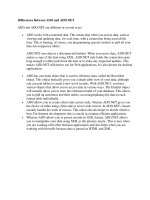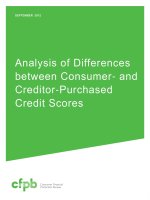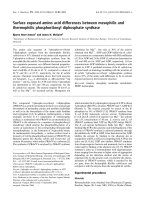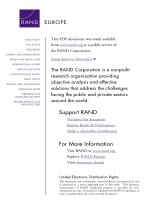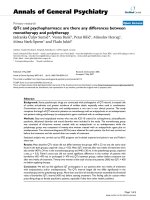Differences between american and british english rtertertreteteteeeeeeeeeeeeeeeeeeeeeeumdfgggggmarize
Bạn đang xem bản rút gọn của tài liệu. Xem và tải ngay bản đầy đủ của tài liệu tại đây (195.65 KB, 6 trang )
Differences Between American and British English
Author: Mohammad Heidari
Source: www.EnglishPts.ir
While there are certainly many more varieties of English, American English and British English are the two
varieties that are taught in most ESL/EFL programs. Generally, it is agreed that no one version is "correct"
however, there are certainly preferences in use. The three major differences between between American
and British English are:
Pronunciation - differences in both vowel and consonants, as well as stress and intonation
Vocabulary - differences in nouns and verbs, especially phrasal verb usage
Spelling - differences are generally found in certain prefix and suffix forms
The most important rule of thumb is to try to be consistent in your usage. If you decide that you want to
use American English spellings then be consistent in your spelling (i.e. The color of the orange is also its
flavour - color is American spelling and flavour is British), this is of course not always easy - or possible.
The following guide is meant to point out the principal differences between these two varieties of English.
Use of the Present Perfect
In British English the present perfect is used to express an action that has occurred in the recent past that
has an effect on the present moment. For example:
I've lost my key. Can you help me look for it?
In American English the following is also possible:
I lost my key. Can you help me look for it?
In British English the above would be considered incorrect. However, both forms are generally accepted in
standard American English. Other differences involving the use of the present perfect in British English
and simple past in American English include already, just and yet.
British English:
I've just had lunch
I've already seen that film
Have you finished your homework yet?
American English:
I just had lunch OR I've just had lunch
I've already seen that film OR I already saw that film.
Have your finished your homework yet? OR Did you finish your homework yet?
Possession
There are two forms to express possession in English. Have or Have got
Do you have a car?
Have you got a car?
He hasn't got any friends.
He doesn't have any friends.
She has a beautiful new home.
She's got a beautiful new home.
While both forms are correct (and accepted in both British and American English), have got (have you got,
he hasn't got, etc.) is generally the preferred form in British English while most speakers of American
English employ the have (do you have, he doesn't have etc.)
The Verb Get
The past participle of the verb get is gotten in American English. Example He's gotten much better at
playing tennis. British English - He's got much better at playing tennis.
Vocabulary
Probably the major differences between British and American English lies in the choice of vocabulary.
Some words mean different things in the two varieties for example:
Mean: (American English - angry, bad humored, British English - not generous, tight fisted)
Rubber: (American English - condom, British English - tool used to erase pencil markings)
There are many more examples (too many for me to list here). If there is a difference in usage, your
dictionary will note the different meanings in its definition of the term. Many vocabulary items are also
used in one form and not in the other. One of the best examples of this is the terminology used for
automobiles.
American English - hood
British English - bonnet
American English - trunk
British English - boot
American English - truck
British English - lorry
Once again, your dictionary should list whether the term is used in British English or American English.
For a more complete list of the vocabulary differences between British and American English use this
British vs. American English vocabulary tool.
Prepositions
There are also a few differences in preposition use including the following:
American English - on the weekend
British English - at the weekend
American English - on a team
British English - in a team
American English - please write me soon
British English - please write to me soon
Past Simple/Past Participles
The following verbs have two acceptable forms of the past simple/past participle in both American and
British English, however, the irregular form is generally more common in British English (the first form of
the two) and the regular form is more common to American English.
Burn
Burnt OR burned
Dream
dreamt OR dreamed
Lean
leant OR leaned
Learn
learnt OR learned
Smell
smelt OR smelled
Spell
spelt OR spelled
Spill
spilt OR spilled
Spoil
spoilt OR spoiled
Spelling
Here are some general differences between British and American spellings:
Words ending in -or (American) -our (British) color, colour, humor, humour, flavor, flavour etc.
Words ending in -ize (American) -ise (British) recognize, recognise, patronize, patronise etc.
The best way to make sure that you are being consistent in your spelling is to use the spell check on your
word processor (if you are using the computer of course) and choose which variety of English you would
like. As you can see, there are really very few differences between standard British English and standard
American English. However, the largest difference is probably that of the choice of vocabulary and
pronunciation.
Here are some of the main differences in vocabulary between British and American English. This
page is intended as a guide only. Bear in mind that there can be differences in the choice of specific
terms depending on dialect and region within both the USA and the UK.
British English
anti-clockwise
articulated lorry
autumn
barrister
bill (restaurant)
biscuit
block of flats
bonnet (clothing)
bonnet (car)
boot
bumper (car)
caravan
car park
chemist's shop
chest of drawers
chips
the cinema
clothes peg
coffin
crisps
crossroads
cupboard
diversion
drawing-pin
drink-driving
driving licence
dual carriageway
dummy (for baby)
dustbin
dustman
engine
estate agent
estate car
film
flat
flat tyre
flyover
gearbox (car)
gear-lever
Girl Guide
ground floor
handbag
high street
holiday
jam
jug
juggernaut
lift
lorry
mad
main road
maize
maths
American English
counter-clockwise
trailer truck
autumn, fall
Attorney
bill, check
Cookie
apartment building
Hat
Hood
Trunk
bumper, fender
Trailer
parking lot
drugstore, pharmacy
dresser, chest of drawers, bureau
fries, French fries
the movies
Clothespin
coffin, casket
potato chips
intersection; crossroads (rural)
cupboard (in kitchen); closet (for clothes etc)
Detour
Thumbtack
drunk driving
driver's license
divided highway
Pacifier
garbage can, trash can
garbage collector
engine, motor
real estate agent
station wagon
film, movie
apartment, flat, studio
flat tire
Overpass
Transmission
Gearshift
Girl Scout
ground/first floor
handbag, purse, shoulder bag
main street
Vacation
jam, preserves
jug, pitcher
18-wheeler
Elevator
truck, semi, tractor
crazy, insane
Highway
Corn
Math
motorbike
motorway
motorway
nappy
naughts and crosses
pants, underpants
pavement
pet hate
petrol
The Plough
pocket money
post
postbox
postcode
postman
pub
public toilet
railway
return (ticket)
reverse charge
ring road
road surface
roundabout
rubber
rubbish
rubbish-bin
saloon (car)
shop
silencer (car)
single (ticket)
solicitor
spanner
sweets
taxi
tea towel
telly (informal), TV
third-party insurance
timetable
tin
toll motorway
torch
trousers
tube (train)
underground (train)
vest
waistcoat
wallet
wellington boots
whisky
zip
Motorcycle
freeway, expressway
highway, freeway, expressway, interstate highway, interstate
Diaper
tic-tack-toe
underpants, drawers
Sidewalk
pet peeve
gas, gasoline
Big Dipper
Allowance
Mailbox
zip code
mailman, mail carrier, letter carrier
Bar
rest room, public bathroom
Railroad
round-trip
collect call
beltway, freeway/highway loop
pavement, blacktop
traffic circle, roundabout
Eraser
garbage, trash
garbage can, trashcan
Sedan
shop, store
Muffler
one-way
lawyer, attorney
wrench
candy
taxi, taxi cab
dish towel
television, TV
liability insurance
schedule
can
toll road, turnpike
flashlight
pants, trousers
subway
subway
undershirt
vest
wallet, billfold
rubber boots, rain boots
whiskey, scotch
zipper



